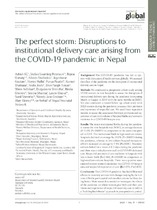The perfect storm: Disruptions to institutional delivery care arising from the COVID-19 pandemic in Nepal

View/
Date
2021Author
Ashish, K C
Peterson, Stefan Swartling
Kinney, Mary
Metadata
Show full item recordAbstract
Background The COVID-19 pandemic has led to system-wide disruption of health services globally. We assessed
the effect of the pandemic on the disruption of institutional
delivery care in Nepal.
Methods We conducted a prospective cohort study among
52356 women in nine hospitals to assess the disruption of
institutional delivery care during the pandemic (comparing
March to August in 2019 with the same months in 2020).
We also conducted a nested follow up cohort study with
2022 women during the pandemic to assess their provision
and experience of respectful care. We used linear regression
models to assess the association between provision and experience of care with volume of hospital births and women’s
residence in a COVID-19 hotspot area.
Results The mean institutional births during the pandemic across the nine hospitals was 24563, an average decrease
of 11.6% (P<0.0001) in comparison to the same time-period in 2019. The institutional birth in high-medium volume
hospitals declined on average by 20.8% (P<0.0001) during
the pandemic, whereas in low-volume hospital institutional birth increased on average by 7.9% (P=0.001). Maternity
services halted for a mean of 4.3 days during the pandemic
and there was a redeployment staff to COVID-19 dedicated
care. Respectful provision of care was better in hospitals with
low-volume birth (β=0.446, P<0.0001) in comparison to
high-medium-volume hospitals. There was a positive association between women’s residence in a COVID-19 hotspot
area and respectful experience of care (β=0.076, P=0.001).
Conclusions The COVID-19 pandemic has had differential
effects on maternity services with changes varying by the volume of births per hospital with smaller volume facilities doing better. More research is needed to investigate the effects
of the pandemic on where women give birth and their provision and experience of respectful maternity care to inform
a “building-back-better” approach in post-pandemic period.
